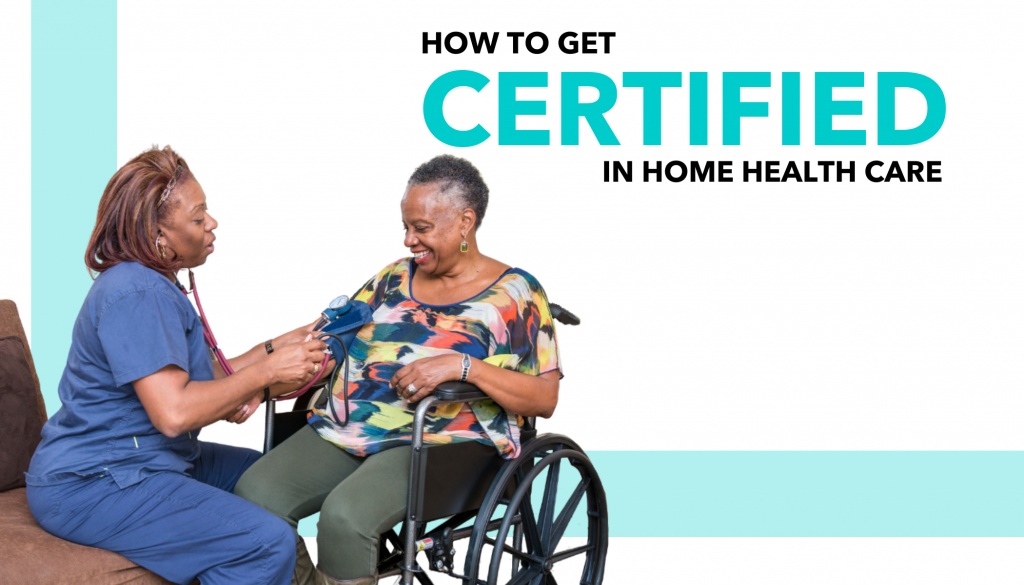How to Get Certified in Home Health Care
Get Certified in Home Health Care
Helping people who are sick get better while staying in their own home can be rewarding and fulfilling. It can also be a big adventure! You get to meet people from all walks of life and help them when they most need a hand up.
There are over 3 million home health and personal care aides in the US and it’s an industry that keeps on growing. The number of people who are over the age of 65 is predicted to more than double in the coming decades. It’s not only older people who need home health care but seniors often need assistance when dealing with chronic diseases and coming out of the hospital. In the coming years, many more people will need access to easy health care and assistance in their homes.
So, if you’re wondering how you can be part of the fun and make a positive impact in the homes of patients, keep calm and read on! We’re going to get into the nitty gritty of home health: what it is, what certifications are needed, what careers are out there, what the job outlook is, and more.
What is home health care?
Home health care covers a large spectrum. This means that many different responsibilities and jobs can fall on the shoulders of home health workers.
Home health care happens when a doctor recommends a patient receive care in their home without having to come into the doctor’s office. This can make life easier for both the doctor and the patient and help expedite their healing.
What type of work does a home health care worker do? They might:
- clean surgical wounds and change bandages
- give medical injections
- educate patients on their own care
- help with bathing
- monitor a patient who has a serious health condition
- clean a patient’s home
- prepare nutritious meals
- help administer prescription drugs
- check vitals like temperature, breathing, and heart rate
- help coordinate a patient’s care
When a patient receives care from a doctor, they have their immediate needs addressed. If they just came out of surgery, for example, the doctor might prescribe antibiotics to make sure an infection doesn’t begin in their wound and give them instructions on how to behave so they can heal.
Once the patient goes home, things get trickier. A home health care aide can visit, according to the doctor’s orders, which can help. They can make sure the patient is taking their medication as prescribed, eating their meals, and getting enough rest and exercise, depending on their situation. The home health care worker can also help make sure the patient is getting better, or remaining as stable as possible, by keeping track of their routines, helping them, and monitoring their basic vital signs.
Sometimes, a home health care worker is simply there to help a patient do things they can’t do anymore on their own due to aging or a growing disability. In this case, it’s all about helping the patient remain in their home and live an independent life, for as long as possible.
How to get your home health care certification
If you like the idea of working with the general public and helping people, being a home health care aide might be for you! In many cases, for entry-level positions you don’t need much formal education to begin. This could be a rewarding career path and the beginning of a larger role in the field of health care, if you decide to pursue extra education and training.
Ready to get started? Here’s a bit about what you need to become a certified home health aide, and what steps you can follow to achieve this.
The requirements for being a certified home health aide
To be an entry-level home health aide (HHA) in the US, you don’t need a high school diploma or to complete a General Education Development (GED) test or exam. You will need to complete a certain number of supervised training hours under a certified professional, however. It’s also necessary that you love helping people, and to have a general zest for life!
Why is this the case? Home health care workers can find themselves working with people who may have many challenges in their life. This means they might not always wake up on the right side of the bed, so to speak. If you have a natural ability to see the bright side of life and to encourage others every step of the way, this can be a definite asset in this field.
What about training? Once you achieve your entry-level certification, you can choose to go further and strive for more. You might find you’re really interested in helping people and learning more about the medical profession. You might want to strive, eventually, to become a licensed nurse, or a registered nurse. Of course, you’ll need to attend technical or vocational school for one to two years to attain this higher certification. For these other levels of work you will need to have your high school diploma or GED.
The steps to follow
1) Volunteer helping people and gather references
Volunteering in your area of interest is always a great way to get started in any field. See if you can find a position as a volunteer at your local hospital or nursing home. Talk to people and help with any duties you’re permitted to. Get people, (staff and patients), to write up testimonials, reviews, and references about how good you are at what you do. Show why you would be a great candidate for a position as a home healthcare aide.
2) Write an amazing resume
Next, attend a local workshop on writing resumes and get started on your own. If writing isn’t your thing, pay someone to write your resume for you. You want to put your best foot forward and truly shine! Local libraries often have resume writing workshops and connections to job hunting free agencies that can help you out.
3) Research job sites like Indeed.com
One of the easiest routes to becoming an HHA is to simply apply for the job. Research job sites like Indeed.com to find available positions. Job websites have entry-level home health care positions listed all across the US and they’re perfect for looking for jobs that match your experience.
Upload your resume and create a profile. Set your email notifications to “on” so interested agencies and individuals can connect with you easily.
You can also search for home care agencies in your area and visit these in person. Bring a paper copy of your resume with you. Dress to impress and introduce yourself. Explain that you’re looking for a position as an HHA and give them a copy of your resume. If they have a business card, take one to call later and inquire about existing jobs once more.
4) Complete your training
To become an HHA, you need to complete training under someone who already is certified. They’ll teach you all about safety in the home, how to be prepared for an emergency, the importance of keeping things clean, housekeeping, and things like how to prepare special food such as purees. You’ll also learn how to help control infections, monitor a patient’s vital signs, and what constitutes nutritious meals.
5) Get certified at the state level
Once you’re trained, you can become certified as a home health care aide at the state level. With statewide certification, things open up a bit more. This means you can choose to go even further and increase your job opportunities. This type of certification allows you to work with Medicare and Medicaid, which can be a definite advantage.
In order to reach this level, you need to complete a minimum of 16 hours of supervised training, as per federal regulations. (Some states require up to 75 hours of training). You might also need to complete an evaluation to show what you know and pass a written exam.
You can also become certified as an HHA by attending a program at a college or technical school. You can take courses and become certified by the National Association of Home Care and Hospice, which is a non-profit based in Washington D.C.
During this training, your schooling will cover a number of topics including:
- Medical terminology
- Healthcare fundamentals
- CPR and first aid
- Bathing and toileting
- Nutrition
- Keeping a patient’s house clean
- How to check blood pressure
- How to interact with patients
- How to transfer heavy patients safely
You can feel proud you’re learning to help people in need and making a true contribution to patients’ daily lives for the better.
6) Search for a better level job
Now, you can start your job search all over again with your new certification! This is an exciting step that can lead to additional future success.
7) Decide if you want to go even further
If you really love what you’re doing while working as a home health care aide, you might try to advance even further up the career ladder. You might be interested in becoming a licensed practical nurse (LPN) or a certified nursing assistant (CNA). You’ll need to attend some more schooling to get to this level but it can be worth it. Many vocational and technical schools offer nursing programs that only take one or two years to complete.
The benefits of home health
Home health care brings so many benefits to patients. Staying in a hospital provides patients with expert care and peace of mind that the right doctors and tools are close by should a medical emergency occur. Once a patient’s care levels off and stabilizes, however, being able to be cared for at home can be better in many cases.
Faster healing for patients
Home is a familiar place of comfort for many patients, and being at home can actually help some people heal faster. Patients who are relaxed and less stressed are more likely to get better sooner. In addition, there’s usually a lower risk of infection at home. Hospitals are full of antibacterial substances but also…disease and bacteria. Patients who have weakened immune systems can potentially fare better at home where there are fewer people and less bacteria and viruses circulating.
More affordable care
Home care is also often more affordable than having a patient holed up in a hospital for days or weeks on end. In fact, some studies show home care can be up to 40% less expensive than institutionalized care, which is a huge difference. By working as a home health care aide, you can help people recover at a lower cost, in the comfort of their own home.
Home health care careers
As described above, you can have a career in home health care at many different levels. You might be helping patients with bathing, cooking, cleaning, basic medical care, getting dressed, and changing their bandages. And you might be doing more.
A home health care worker can become certified at the state level and go onto become a certified or registered nurse by going to additional schooling. If you love caring for people and working closely one-on-one, becoming an HHA may be an ideal route for you to take. This career option is good for people who have an eye for detail and show they care through their attention to people’s needs. You should be comfortable helping with daily tasks and be able to stay professional while working with people of all personality types.
Start your journey today!
You never know where life will take you until you try. If being a home health care aide sounds attractive to you, get started by volunteering today. Maybe you’ve already had experience helping a family member get better once they were released from the hospital or maybe you feel inspired from a friend’s success story. Whatever your circumstances, you can only know if this career path is for you by getting your feet wet. Get certified as a home health care worker and start your journey today!
Fill out our quick contact form and we will get to you soon.
Or
Give us a call and we can get you connected to an experienced recruiter today!
OR
Check out our job board and search for the perfect job for you!



